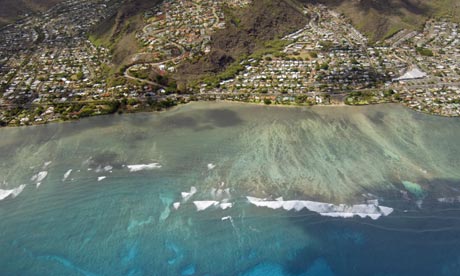Coral reefs: ‘absolute guarantee of their annihilation’
Destroyed by rising carbon levels, acidity, pollution, algae, bleaching and El Niño, coral reefs require a dramatic change in our carbon policy to have any chance of survival, report warns 
By David Adam Animal, vegetable and mineral, a pristine tropical coral reef is one of the natural wonders of the world. Bathed in clear, warm water and thick with a psychedelic display of fish, sharks, crustaceans and other sea life, the colourful coral ramparts that rise from the sand are known as the rainforests of the oceans. And with good reason. Reefs and rainforests have more in common than their beauty and bewildering biodiversity. Both have stood for millions of years, and yet both are poised to disappear. If you thought you had heard enough bad news on the environment and that the situation could not get any worse, then steel yourself. Coral reefs are doomed. The situation is virtually hopeless. Forget ice caps and rising sea levels: the tropical coral reef looks like it will enter the history books as the first major ecosystem wiped out by our love of cheap energy. Today, a report from the Australian government agency that looks after the nation’s emblematic Great Barrier Reef reported that “the overall outlook for the reef is poor and catastrophic damage to the ecosystem may not be averted”. The Great Barrier Reef is in trouble, and it is not the only one. Within just a few decades, experts are warning, the tropical reefs strung around the middle of our planet like a jewelled corset will reduce to rubble. Giant piles of slime-covered rubbish will litter the sea bed and spell in large distressing letters for the rest of foreseeable time: Humans Were Here. “The future is horrific,” says Charlie Veron, an Australian marine biologist who is widely regarded as the world’s foremost expert on coral reefs. “There is no hope of reefs surviving to even mid-century in any form that we now recognise. If, and when, they go, they will take with them about one-third of the world’s marine biodiversity. Then there is a domino effect, as reefs fail so will other ecosystems. This is the path of a mass extinction event, when most life, especially tropical marine life, goes extinct.” Alex Rogers, a coral expert with the Zoological Society of London, talks of an “absolute guarantee of their annihilation”. And David Obura, another coral heavyweight and head of CORDIO East Africa, a research group in Kenya, is equally pessimistic: “I don’t think reefs have much of a chance. And what’s happening to reefs is a parable of what is going to happen to everything else.” …
How global warming sealed the fate of the world’s coral reefs via Apocadocs
I visited St. John twice, 10 years apart, and the difference was utterly appalling. A brilliantly colored snorkling experience of incredible brilliance and deep saturation of every hue, had been reduced to shades of grey.
The same thing is happening on land and people are just slightly more oblivious to the impending ecosystem collapse and subsequent, inevitable mass extinctions. Trees are the foundation of the ecosystem on land as coral reefs are for all life in the sea.
It is so obvious to me and yet virtually everyone else, even environmentalists and foresters and ecologists and farmers, seem willfully blind to the obvious empirical evidence of vegetative demise.
Any comments appreciated, where I am posting pictures and links to scientific research at witsendnj.blogspot.com
Gail, I linked to your blog, and subscribed in my RSS reader. it's very informative, I'm glad you're doing it.
Why – I am beyond flattered to be included on your list with such illustrious websites! Desdemona is at the top of my bookmarks. It's of some comfort I guess, to know we will all go to our collective demise in such good company.
Thanks for all your links to vital, important, and unusual research.
We need to know.